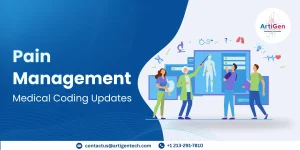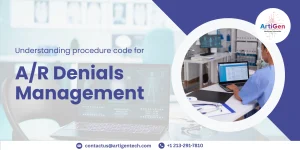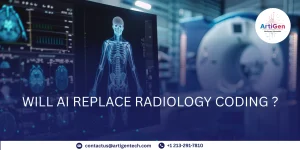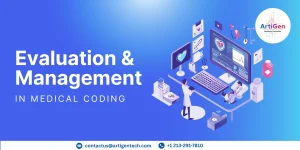How Medical Coding Automation Reduces Claim Denials in Healthcare
Introduction
In today’s healthcare ecosystem, one of the most pressing challenges for the providers is claims denials. With the rise of medical coding automation, powered by AI and NLP, hospitals can reduce revenue leakage, improve compliance, and strengthen denial management strategies. According to recent research, Denials of nearly 1 in 5 medical claims result in billions of dollars in lost revenue annually. Denials can often stem from incomplete documentation, coding errors and compliance gaps.
This is where the revenue cycle AI is being transformed by medical coding automation, which is powered by artificial intelligence (AI), machine learning (ML), and natural language processing (NLP). By automating coding workflow, healthcare providers can accelerate reimbursement, enhance compliance and reduce claims in denials management.
In this article, let’s explore how ArtigenTech takes place in medical coding automation reduces claim denials in healthcare, supported by industry statistics, high-impact use cases, and proven benefits.
Why Claim Denials Are a Growing Problem
- Nearly 50% of Medicare claims are submitted with errors.
- Claims denials reduce hospital revenue integrity solutions and delays in reimbursement
- ICD-10 coding guidelines and CPT coding rules can be misinterpreted when coding manually.
- Denials affect patient satisfaction and add to the administrative burden.
AI in medical coding helps the providers to prevent these problems by improving accuracy, compliance and efficiency.
What Is Medical Coding Automation?
Medical coding automation refers to the use of AI-powered tools that automatically assign ICD-10 codes, CPT, and HCPCS codes from physician notes, EHR data, and clinical documentation.
Role of AI, NLP, and RPA in Medical Coding Automation;
Natural Language Processing (NLP): Extracts medical terms, symptoms from unstructured date, and medical terms.
Machine Learning (ML): learns from previous claims to increase precision and adjust to payer policies.
Automated Audits: verify compliance with healthcare regulations and payers policies.
RPA (Robotic Process Automation): Automates repetitive tasks like data entry, claim submission, and eligibility checks, reducing manual errors and speeding up revenue cycle management.
This reduces manual errors and strengthens revenue cycle management in healthcare.
Top Causes of Claim Denials
Hospitals can often face denials due to:
- Invalid CPT and ICD-10 codes
- Incomplete patient record documentation
- Failure to meet payer-specific coding rules
- Submission of duplicate claims
- Noncompliance with medical billing regulations
With medical coding automation software, these risks can be minimized.
How ArtigenTech’s Medical Coding Automation Software Reduces Claim Denials
Improves Coding Accuracy: Manual coding errors like missing modifiers, wrong code selection, or outdated ICD-10 usage are eliminated by medical coding automation. The first-pass claim acceptance rate is increased by AI-powered systems which ensure consistent coding practices.
Strengthens Compliance with Payer Guidelines: Every payer has different requirements for billing and coding. Real-time regulatory changes (ICD-10, CPT, HCPCS, HCC, and MEAT criteria) are integrated into automated systems. This reduces denials caused by non-compliance.
Enhances Documentation Completeness: One of the top causes of denials is incomplete documentation. Before submitting a claim, automation checks clinical notes against coding standards and flags missing details before claim submission.
Enables Real-Time Claim Validation: automation validates claims in real time instead of waiting for rejections, making sure that coding errors are identified early.
Accelerates Revenue Cycle Management: By reducing errors, AI in medical coding improves first-pass resolution rates, reduces accounts receivable (A/R) days, and ensures faster reimbursements.
Reduces Administrative Burden: Manual denial management consumes 30–40% of RCM staff’s time. Automation handles repetitive coding tasks, freeing staff to focus on complex cases and appeals.
Statistics: Impact of Automation on Claim Denials management
- 97% reduction in claim denials using autonomous coding.
- 30–50% decrease in overall denial management rates with AI-powered coding solutions.
- 25% boost in first-pass claim acceptance.
- Automation reduced the cost of denial resolution from $40 per claim to less than $15.
Benefits of Medical Coding Automation for Healthcare Providers
Benefit | Impact on Claim Denials |
Accurate ICD-10 & CPT code selection | Prevents miscoding and rejection |
Compliance with payer rules | Reduces rejections due to non-compliance |
Automated documentation validation | Ensures complete and clean claims |
Real-time denial alerts | Flags high-risk claims before submission |
Higher first-pass acceptance rate | Faster reimbursement and lower revenue leakage |
Lower operational costs | Less rework, fewer manual interventions |
Future of Denial Management with AI Medical Coding
The future of denial prevention lies in end-to-end automation of the revenue cycle AI. With AI tools integrated into payer portals, billing software, and EHR systems, providers can:
- Near-zero denial rates
- Real-time coding and compliance validation
- Using predictive denial management analytics to predict and avoid mistakes
- Faster reimbursements with less administrative burden
Medical coding automation will play a significant role in improving patient satisfaction and financial sustainability as the artificial intelligence in healthcare sector transitions to value-based care.
Compliance and Audit Readiness
- Check real-time claim submission for potential errors and inconsistencies.
- Provides corrections for incorrect CPT or HCPCS codes before filing.
- To avoid needless rejections, duplicate claims are highlighted.
- Verifies that every procedure satisfies the requirements for medical necessity.
- Monitors payer-specific guidelines to minimize noncompliance.
- Generates audit-ready reports for internal and external review.
- Integrates with EHR systems to maintain coding accuracy at the source.
- Supports coder training by flagging frequent mistakes.
Conclusion
Medical coding automation is important for modern healthcare industry. Hospitals can achieve financial stability, audit readiness, and higher patient satisfaction by streamlining revenue cycle management.
Implementing AI-powered medical coding solutions ensures fewer errors, faster reimbursements, and stronger hospital revenue integrity solution, making it a vital investment for any healthcare provider.
👉 In short: Medical coding automation is the future of denial prevention in healthcare.
Get a Quote
Recent blog post
 06 Jan 2026 Most Commonly Used CPT Codes in Gastroenterology
06 Jan 2026 Most Commonly Used CPT Codes in Gastroenterology 16 Dec 2025 PAIN MANAGEMENT MADICAL CODING UPDATES
16 Dec 2025 PAIN MANAGEMENT MADICAL CODING UPDATES




